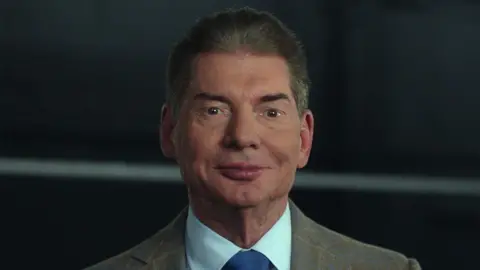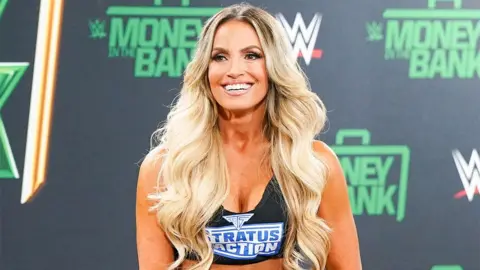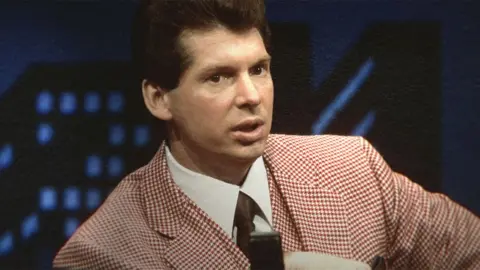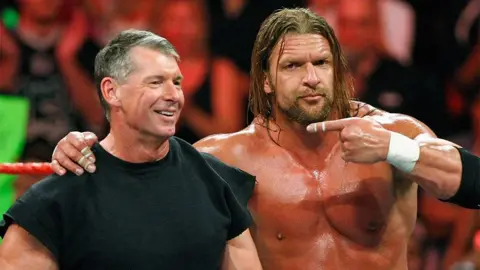 Mr. McMahon/Netflix
Mr. McMahon/NetflixA new Netflix documentary claims to “pull back the curtain” on former WWE boss Vince McMahon – but does it succeed?
The six-part series Mr. McMahon – named after the alter-ego character he portrayed on-screen in the mid-90s – covers his life, decades-long career and the various scandals that have followed him.
It features interviews with the 79-year-old himself, as well as family members, former wrestlers and business associates.
But whether it tells us anything new about the real Vince McMahon is up for debate.
He pulled out of filming after a former employee accused him of sex trafficking, and some reviewers have said the series struggles with this missing element.
Others said it’s still a fairly “honest portrait” and comprehensive, depending on how much you already know going in.
But does it get us any closer to the truth?
The allegations against Vince McMahon
McMahon got his own review in early.
He called the series “misleading” and accused its makers of taking “the predictable path of conflating the ‘Mr. McMahon’ character with my true self, Vince”.
The billionaire businessman resigned from WWE’s parent company at the start of this year when ex-employee Janel Grant filed a sex trafficking lawsuit against him,
He’s denied her accusations as “lies” and a “vindictive distortion of the truth”.
You won’t hear much about this case in the documentary, but previous allegations are discussed.
WWE’s first female referee Rita Chatterton accused McMahon of rape, but in the series he insists “that never happened” and it was “consensual”.
He withdrew his defamation lawsuit against her and last year, reports say, paid her a multimillion-dollar settlement.
He also calls the US government – who took him to court on charges of illegal steroid distribution – the “biggest bullies”.
McMahon was found not guilty in that case.
‘Women were like a toy’
 Getty Images
Getty ImagesThe WWE often faced criticism in the past for its portrayal of women, especially during its so-called Attitude Era between 1997 and 2002.
Matches became far less family friendly, with wrestlers frequently seen bleeding and female stars competing in “bra and panties” bouts which ended when an opponent’s costume was torn off.
Former WWE Women’s Champion Trish Stratus says roles for women were “overly sexual” and recalls once being made to get on her knees and bark like a dog before removing her clothes.
“Women were not considered wrestlers…” she says.
“Eye candy, that’s kind of what they were at the time,” she says in the show.
Anthony White – aka Tony Atlas – agrees with her that the segments have not aged well.
“We would have been looked upon in today’s society as some of the worst human beings walking the face of the Earth,” he tells the documentary.
“We abused the hell out of women. They were like a toy for us.”
McMahon’s daughter Stephanie, who often featured in storylines written by her father – which she describes as a “little bit weird” – says “it was a different time in our business”.
Current chief content officer and McMahon’s son-in-law Paul “Triple H” Levesque questions how they “ever [got] away with that stuff”.
In the documentary McMahon says the trend was “more or less following what was going on in the entertainment business”, and some of the highest-rated segments featured women.
‘Nothing I wouldn’t do for business’
 Mr. McMahon/Netflix
Mr. McMahon/NetflixVince McMahon has gained a reputation as a ruthless operator, and the documentary does explore some of the events that helped to build this image.
One is a notorious stitch-up – or “screwjob”, in wrestling terms – involving legendary wrestler Bret “The Hitman” Hart.
During tensions over his move to rival firm World Championship Wrestling (WCW), McMahon worked with others behind Hart’s back to change the scripted outcome of a 1997 match.
The Canadian ended up losing his championship title to Shawn Michaels in front of a hometown crowd in Montreal.
McMahon describes a similar screwjob in 1985, involving former women’s champ Wendi Richter, as “show business… nothing personal”.
“And there is nothing I wouldn’t do for business.”
In the documentary, McMahon says he wanted Bret Hart to do the “right thing” for the business.
“To this day, I don’t regret any of it.”
Vince McMahon vs Mr. McMahon
 Getty Images
Getty ImagesMcMahon shares details of his own childhood, including how he was abused by his step-father and meeting his real dad for the first time when was 12.
“I know from a psychological standpoint if you’re abused as a kid, the tendency is for you to abuse,” he says, before adding: “That’s just a cop-out.”
His own position as a father is a theme the documentary returns to repeatedly and he reveals he was “tough” on his own children, Shane and Stephanie.
Members of the cast also describe him as a father figure.
McMahon himself says: “I still haven’t quite figured out who I am.”
Characters are the lifeblood of WWE, he tells the documentary makers – but is he playing a character himself?
We never quite find out.
“Sometimes the lines of reality, of fact and fiction, are very blurred in our business,” he says.
Critics say this is a helpful get-out-of-jail-free card, placing blame on alter-ego Mr McMahon – a corrupt boss who abuses his power.
“Which is the character and which is me? I guess maybe it’s a blend and I would suggest that maybe one is exaggerated a little bit,” says McMahon.
“I’m not so sure which one.”
But when asked what traits he shares with the character, he says: “None whatsoever.”
Many of those close to him also seem unsure.
His son Shane says: “Mr. McMahon is an extension of Vince McMahon, but blown out of proportion.”
It’s a view shared by ex-champion Stone Cold Steve Austin, who says the character is “pretty close to Vince the man”, but “highly exaggerated”.
Others, such as Shawn Michaels, say there’s not much difference between the two, and WWE executive Bruce Prichard says McMahon’s in-ring diatribes were similar to the ones he’d deliver in the board room.
Former superstar Hulk Hogan’s opinion is much more clear-cut.
“Exactly the same person, not a far stretch,” he says.

Listen to Newsbeat live at 12:45 and 17:45 weekdays – or listen back here.


